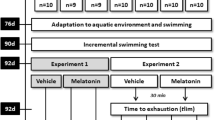Abstract
The aim of the present study was to investigate how zinc (Zn) deficiency and supplementation affect glycogen content of the liver and plasma lactate and leptin levels of rats performing acute swimming exercise just before the blood samples were obtained. Four sets of 10 rats each served as the (1) Zn-deficient group, (2) Zn-supplemented group, (3) swimming controls, and (4) normal controls. Plasma lactate levels of Zn-deficient animals were significantly higher than those in the other three groups (p<0.01), and those in the swimming controls (group 3) were significantly higher than in the Zn-supplemented animals, group 2 (p<0.01). The plasma glucose of the Zn-deficient group was significantly higher than all other groups (p<0.01) and that of group 2 was significantly lower than group 4 (p<0.01). Glycogen levels in liver of the Zn-deficient animals was significantly lower than groups 2 and 4 (p<0.01), and, in turn, were higher than for group 3 (p<0.01). The plasma leptin and Zn levels of group 1 were significantly lower than in all other groups (p<0.01). These results suggest that Zn deficiency exerts a negative influence in the above-mentioned parameters and that Zn supplementation has the opposite effect.
Similar content being viewed by others
References
R. H. Dressenderfor, C. E. Wade, C. L. Keen, et al., Plasma mineral levels in marathon runners during a 20-day road race, Phys. Sportsmed. 10, 113–118 (1982).
A. Cordova, Variations in serum iron and fatigue levels after elective abdominal, Surg. Med. Sci. Res. 20, 119–120 (1992).
G. Haralambie, Serum zinc in athletes in training, Int. J. Sports Med. 2, 135–138 (1981).
F. Couzy, P. Lafargue, and C. Y. Guezennec, Zinc metabolism in the athlete: influence of training nutrition and other factors, Int. J. Sports. Med. 11, 263–266 (1990).
S. Khaled, J. F. Brun, G. Cassanas, et al., Effects of zinc supplementation on blood rheology during exercise, Clin. Hemorheol. Microcirc. 20, 1–10 (1999).
A. Cordova and M. Alvarez-Mon, Behaviour of zinc in physical exercise: a special reference to immunity and fatigue, Neurosci. Biobehav. Rev. 19, 439–445 (1995).
A. Cordova and F. J. Navas, Effect of training on zinc metabolism: changes in serum and sweat zinc concentrations in sportsmen, Ann. Nutr. Metab. 42, 274–282 (1998).
S. Moschos, J. L. Chan, and C. S. Mantzoros, Leptin and reproduction, Fertil. Steril. 77, 433–44 (2002).
H. F. Mangian, R. G. Lee, G. L. Paul, et al., Zinc deficiency suppresses plasma leptin concentrations in rats, J. Nutr. Biochem. 9, 47–51 (1998).
C. S. Mantzoros, A. S. Prasad, F. W. J. Beck, et al., Zinc may regulate serum leptin concentrations in humans, J. Am. Coll. Nutr. 17, 270–275 (1998).
M. D. Chen, Y. M. Song, and P. Y. Lin, Zinc may be a mediator of leptin production in humans, Life Sci. 66, 2143–2149 (2000).
C. Pagano, M. Marzolo, M. Granzotto, et al., Acute effects of exercise on circulating leptin in leal and genetically obese fa/fa rats, Biochem. Biophys. Res. Commun. 255, 698–702 (1999).
J. S. Fisher, R. E. Van-Pelt, O. Zinder, et al., Acute exercise effect on post absorptive serum leptin, Eur. J. Appl. Physiol. 91, 680–686 (2001).
M. Zaccaria, A. Ermolao, S. Roi, et al., Leptin reduction after endurance races differing in duration and energy expenditure, Eur. J. Appl. Physiol. 87, 108–111 (2002).
C. S. Bediz, A. K. Baltac, A. M. Tiftik, et al., Effects of zinc deficiency on some hormones in rats, Selcuk J. Med. 15, 59–63 (1999).
A. K. Baltac, N. Ergene, A. Ates, et al., Serum zinc levels and effect of zinc supplementation on cellular immunity in experimentally induced Toxoplasma gondii infections, J. Turgut Ozal Med. Center 2, 130–134 (1995).
D. Hopwood, Fixation and fixatives, in The Theory and Practice of Histological Techniques, J. D. Bancroft and A. Stevens, eds., Bath Press, Avon, pp. 21–43 (1990).
H. C. Cook, Carbohydrates, in The Theory and Practice of Histological Techniques, J. D. Bancroft and A. Stevens, eds., Bath Press, Avon, pp. 177–213 (1990).
P. J. Fraker, R. Caruso, and F. Kierszenbaum, Alteration in the immune and nutritional status of mice by synergy between zinc deficiency and infection with Trypanosoma cruzi, J. Nutr. 112, 1224–1229 (1982).
S. S. Kutti and J. Kutti, Zinc supplementation in anorexia nervosa, Am. J. Clin. Nutr. 44, 581–582 (1986).
S. Khaled, J. F. Brun, J. P. Micallel, et al., Serum zinc and blood rheology in sportsmen (football players), Clin. Hemorheol. Microcirc. 17, 47–58 (1997).
G. Gold and G. M. Grodsky, Kinetic aspects of comparrmental storage and secretion of insulin and zinc, Experientia 40, 1105–1114 (1984).
R. C. Noland, J. T. Baker, S. R. Boudreau, et al., Effect of intense training on plasma leptin in male and female swimmers, Med. Sci. Sports. Exerc. 33, 227–231 (2001).
I. Karamouzis, M. Karamouzis, I. S. Vrabas, et al., The effects of marathon swimming on serum leptin and plasma neuropeptide Y levels, Clin. Chem. Lab. Med. 40, 132–136 (2002).
M. S. Hickey and D. J. Calsbeek, Plasma leptin and exercise: recent findings, Sports Med. 31, 583–589 (2001).
M. Gleeson and N. C. Bishop, Elite athlete immunology: importance of nutrition, Int. J. Sports. Med. 1, 44–50 (2000).
H. C. Lukaski, Magnesium, zinc, and chromium nutriture and physical activity, Am. J. Clin. Nutr. 72, 585–593 (2000).
A. Singh, D. A. Papanicolaou, L. L. Lawrence, et al., Neuroendocrine responses to running in women after zinc and vitamin E supplementation, Med. Sci. Sports Exerc. 31, 536–542 (1999).
J. F. Brun, C. Dieu-Cambrezy, A. Charpiat, et al., Serum zinc in highly trained adolescent gymnasts, Biol. Trace. Element Res. 471, 373–378 (1995).
M. K. Song, I. K. Hwang, M. J. Rosenthal, et al., Antidiabetic actions of arachidonic acid and zinc in genetically diabetic Goto-Kakizaki rats, Metabolism 52, 7–12 (2003).
Author information
Authors and Affiliations
Rights and permissions
About this article
Cite this article
Kasim Baltaci, A., Ozyurek, K., Mogulkoc, R. et al. Effects of zinc deficiency and supplementation on the glycogen contents of liver and plasma lactate and leptin levels of rats performing acute exercise. Biol Trace Elem Res 96, 227–236 (2003). https://doi.org/10.1385/BTER:96:1-3:227
Received:
Revised:
Accepted:
Issue Date:
DOI: https://doi.org/10.1385/BTER:96:1-3:227




